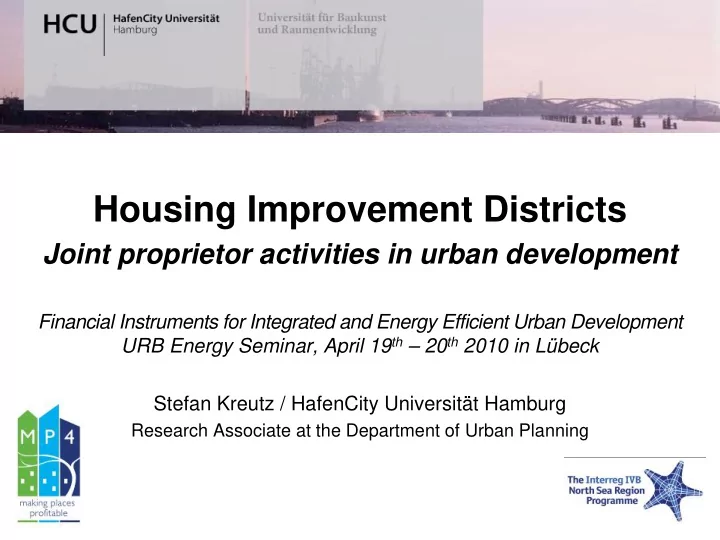

Housing Improvement Districts Joint proprietor activities in urban development Financial Instruments for Integrated and Energy Efficient Urban Development URB Energy Seminar, April 19 th – 20 th 2010 in Lübeck Stefan Kreutz / HafenCity Universität Hamburg Research Associate at the Department of Urban Planning
Outline of the presentation 0. Preliminary remarks 1. Urban Improvement Districts in Germany (BID + HID) 2. The ‘Housing Improvement District’ Model in Hamburg 3. Other models of joint proprietor activities 4. Final remarks Dipl.-Ing. Stefan Kreutz URB-Energy Seminar / April 19 th 2010 in Lübeck
0. Preliminary Remarks Private Initiatives in Urban Development • Increasing importance in Germany • Part of the Federal Building Code since 2006 • Variety of models from voluntary and informal activities to legal instruments like BIDs + HIDs • Additional to public funded strategies Dipl.-Ing. Stefan Kreutz URB-Energy Seminar / April 19 th 2010 in Lübeck
1. Urban Improvement Districts in Germany Urban Improvement Districts • Generic term for Business, Housing, Neighbourhood, Multifamily etc. Improvement Districts • Origin: North-American Model for private initiatives with self assessment / taxation - especially BIDs • Example for privatist tradition of urban development and a weak public sector in Anglo-American countries Dipl.-Ing. Stefan Kreutz URB-Energy Seminar / April 19 th 2010 in Lübeck
1. Urban Improvement Districts in Germany Constitutive features of the UID-model: • Area-based self-organisation of private stakeholders ie. proprietors or business people; • Joint financing via an obligatory levy (no free-riders); • Clearly defined area and limited duration; • Broad spectrum of activities possible Dipl.-Ing. Stefan Kreutz URB-Energy Seminar / April 19 th 2010 in Lübeck
1. Urban Improvement Districts in Germany Transfer of the UID model to Europe • Transfer of the BID-model to Europe in the late 1990s • Legislative UID models today only in the UK, Ireland and in Germany - voluntary models in other countries • Transfer of BID-model to residential areas as Neighbourhood (Housing) Improvement Districts in 2007 in Hamburg (first and only transfer yet) Dipl.-Ing. Stefan Kreutz URB-Energy Seminar / April 19 th 2010 in Lübeck
Federal State UID Legislation UID projects in implementation Dipl.-Ing. Stefan Kreutz URB-Energy Seminar / April 19 th 2010 in Lübeck
2. The Hamburg HID Model Specific attributes of the Hamburg HIDs • Compulsory self-assessment on real property = self-taxing funding mechanism of the proprietors • Quorum for the obligatory proprietor-ballot: min. 30 % positive votes / max. 30 % negative • Clearly defined area • Limited period of time (max. five years) • Management / Implementation through third party • Additionality (“on top”) : complementary services, e.g. enhanced services (street cleaning), capital improvements (public realm), marketing activities Dipl.-Ing. Stefan Kreutz URB-Energy Seminar / April 19 th 2010 in Lübeck
2. The Hamburg HID Model Sources: Ellen Fiedelmeier 2008, Bezirksamt Wandsbek Dipl.-Ing. Stefan Kreutz URB-Energy Seminar / April 19 th 2010 in Lübeck
2. The Hamburg HID Model Property relations Sources: Verfahrensmanagement INQ Steilshoop, BA Wandsbek = Public Housing (20 %) =US Investor (33 %) = Co-operatives (17 %) = Companies = Private Landlords = City of Hamburg = Church Dipl.-Ing. Stefan Kreutz URB-Energy Seminar / April 19 th 2010 in Lübeck
Image and Marketing School Central pedestrian zone Shopping Centre public and private space public and private space Dipl.-Ing. Stefan Kreutz URB-Energy Seminar / April 19 th 2010 in Lübeck
3. Other Models of joint proprietor activities Voluntary activities of proprietors in Germany • Strong involvement of proprietors in area development – especially from public housing companies and housing co-operatives • Single and joint activities of proprietors within different funding programmes for urban development • Special Agreements between public sector and proprietors, e.g. the Cooperation Contract Dipl.-Ing. Stefan Kreutz URB-Energy Seminar / April 19 th 2010 in Lübeck
3. Other Models of joint proprietor activities Joint activities of proprietors • Joint activities as model projects in several Federal States – e.g. “Eigentümerstandortgemeinschaften” • Support and Research from the National Govern- ment (ExWoSt Funding Programme) since 2008 • Spectrum of joint activities: Marketing, Cleaning, Services, Tendering and Construction • Information and Counselling for proprietors Dipl.-Ing. Stefan Kreutz URB-Energy Seminar / April 19 th 2010 in Lübeck
3. Other Models of joint proprietor activities ExWoSt Eigentümerstandortgemeinschaften Dipl.-Ing. Stefan Kreutz URB-Energy Seminar / April 19 th 2010 in Lübeck
4. Final Remarks Comments on the HID Model • Implementation of the HID model still to come • Additional instrument in the tool-box of urban regeneration and development – not a substitute • No influence on private property • Suitability: HID model is not suitable for every neighbourhood, e.g. not for neglected / deprived areas with inactive and/or poor proprietors • Urban Improvement Districts need strong and articulate proprietors to be successful Dipl.-Ing. Stefan Kreutz URB-Energy Seminar / April 19 th 2010 in Lübeck
4. Final Remarks Comments on joint proprietor activities • Intense organisational support necessary • Differences between professional housing companies and amateur landlords • Small scale activities for a start • Pooling of activities is leading to saving effects Dipl.-Ing. Stefan Kreutz URB-Energy Seminar / April 19 th 2010 in Lübeck
4. Final Remarks Concluding remarks • Joint proprietor activities in urban development are a fairly new issue in Germany • Cultural change of attitudes and expectations • Even small and simple solutions need communication and professional organisation • Area-based communication is important • Variety of Models allows tailor-made solutions from informal cooperation to formalised partnerships Dipl.-Ing. Stefan Kreutz URB-Energy Seminar / April 19 th 2010 in Lübeck
Dipl.-Ing. Stefan Kreutz URB-Energy Seminar / April 19 th 2010 in Lübeck
Contact details Stefan Kreutz HafenCity Universität Hamburg Stadtplanung / Projektentwicklung und -management Winterhuder Weg 29-31 D – 22085 Hamburg ++49 40 42827 4545 stefan.kreutz@hcu-hamburg.de www.urban-improvement-districts.de Dipl.-Ing. Stefan Kreutz URB-Energy Seminar / April 19 th 2010 in Lübeck
Recommend
More recommend